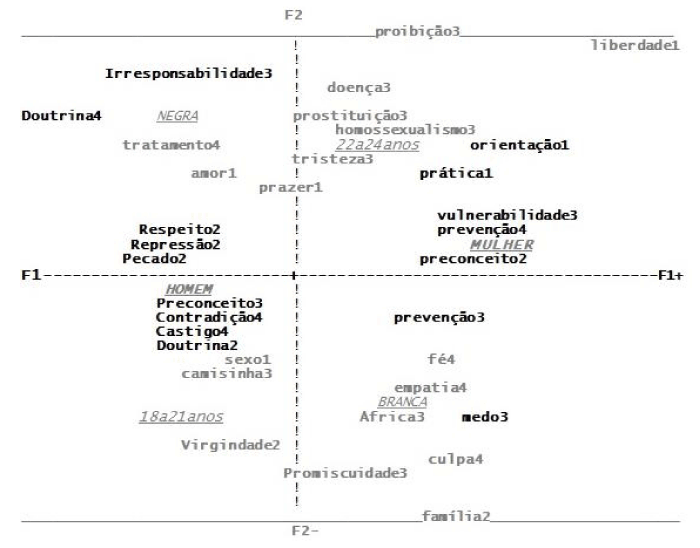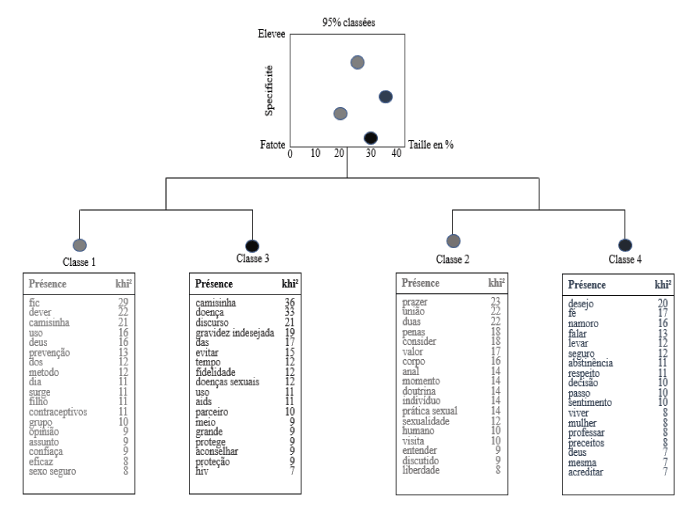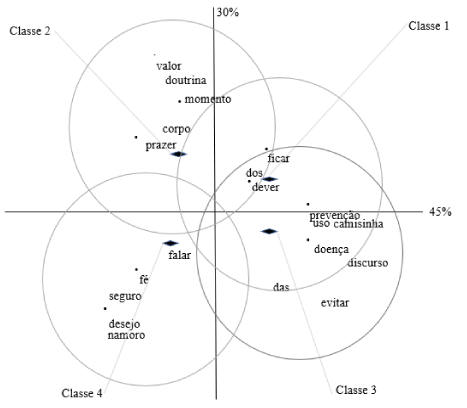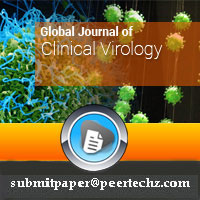Global Journal of Clinical Virology
The cosmic vision of young Catholics on the sexuality interface and prevention of Human Immunodeficiency Virus
Pablo Luiz Santos Couto1, Mirian Santos Paiva2, Antônio Marcos Tosoli Gomes3, Rafael Moura Pecley Wolter4, Marizete Argolo Teixeira5, Carle Porcino2 and e Samantha Souza da Costa Pereira1
2University Federal da Bahia, Brazil
3University of the State of Rio de Janeiro, Brazil
4University Federal of Espirito Santo, Brazil
5State University of the Southwest of Bahia, Brazil
Cite this as
Santos Couto PL, Paiva MS, Antônio Gomes MT, Pecley Wolter RM, Teixeira MA, et al.(2018) The cosmic vision of young Catholics on the sexuality interface and prevention of Human Immunodeficiency Virus. Glob J Clin Virol 3(1): 001-005. DOI: 10.17352/gjcv.000004Objective: To analyze the meanings attributed by young Catholics on the interface prevention to HIV and sexuality from the perspective of social representations.
Methods: It is a qualitative study that used the Theory of Social Representations as a theoretical contribution for analysis and discussion, carried out with 84 practicing young Catholics, who responded to the inducing stimuli of the Free Speech Evocation Test and an open question for the interview in depth. The data were collected online, on facebook, with young participants of the World Youth Day. It was used for the analysis: Correspondence Factor and Lexical Content with the aid of softwares.
Results: On sexuality, so many women with higher levels of schooling as men, represented that sex should be performed freely without prejudice and guilt, but should be done with protection with the use of condoms. However, those with lower levels of education, with a basic (incomplete and basic) level, reaffirm in their representational worldview matrimony, chastity and virginity as hegemonic forms of HIV prevention.
Conclusion: Both Catholic dogmas and scientific knowledge are responsible for conforming the consensuses in the social representations of young Catholics about sexuality, with a focus on HIV Prevention.
Introduction
The world-wide cosmology of people within religions is as much influenced by traditional and reactionary ideologies and values as by progressive scientific knowledge. However, in certain groups, such as those practicing Christian religions such as the Catholic faith, ideologies and doctrines contribute to reaffirming practices and behaviors [1]. As a result of these factors, the Catholic religion has throughout the history of humanity and of the centuries, favored the formation of representations and meanings of social groups, with the intention of maintaining its doctrine intact, preserving its rites, characteristics and symbolism. When it comes to sexual behaviors of its faithful and forms of HIV prevention, the Catholic Church reaffirms discourses about infection and safe sexual practices such as marriage and chastity, without considering that young people in it experience daily dilemmas about which discourse follow [2].
Thus, the discussions here are essential for the compression of the sexual behavior of young Catholics and the way they experience the dilemmas surrounding the discourses to follow, the reactionary/conservative coming from the Catholic Church or the progressive who defends free sex but with the protection favored by the condom. In addition, there is the possibility of this study in contributing to the critical development of health professionals, such as nurses, in the creation of educational practices in sexual health and in childcare, a program of care consistent with the reality of young people practicing Christian religions.
The procedural approach of the theory of social representations (TRS) was the guiding axis of the understanding of socially and unconsciously constructed meanings in the cognitive system [3]. In this way, the article addresses a discussion and reflection of the mental contents that contribute to the representational formation of young Catholics, both in the perspective of maintaining the traditional preaches of the Catholic Church and of progressive ideas, renewing the worldview of the practices and behaviors of some faithful [4].
Thus, it is questioned: How are the meanings that young Catholics give about sexuality and HIV prevention, from the influence of the Catholic Church? The purpose of this study was to analyze the meanings attributed by young Catholics on the interface prevention to HIV and sexuality from the perspective of social representations.
Methods
A study with a qualitative approach that appropriated the TRS, in its procedural perspective, to analyze and discuss the data. The collection of information took place online on Facebook between February and March 2015, as young Catholics between the ages of 18 and 24, both men and women, and their variations in gender and sexuality, participants in the World Youth Day. In addition, they needed to have an account on the social network in question. It should be noted that study participants should be a member of a parish and attend meetings of groups connected to Catholic Charismatic Renewal (RCC) and Mass. There was no applicability of exclusion criteria.
The data were conformed with the help of three specific and essential collection techniques based on TRS: the free association of words applied with 84 young Catholics of facebook and an interview script in depth, with three guiding questions about the relationship sexuality and safe sex with an interface in HIV prevention. For this last technique of data collection, 19 participants agreed to contribute their answers.
Since the information is produced with a word-free recall, they were organized and processed in Tri-Deux Mots software version 2.2 and later analyzed with the aid of Factorial Correspondence Analysis (AFC), from the Factorial Map [5- 7]. The speeches obtained with the in-depth interview were subjected to lexical content analysis, made possible by the software Alceste version 4.5, which issued the Class Dendogram for descending hierarchical analysis and the Lexical Correlation Map for Correspondence Factor Analysis by correlations [7].
The project was approved by the Ethics and Research Committee of the Federal University of Bahia, protocol number 878.042 / 2014. The Free Consent Form and Informado was sent online through the tools provided by Facebook, and after reading, young Catholics confirmed their participation with the digital signature.
Results
Among the 84 participants, 51,2% were men and 48,8% women. The majority came from the state of Bahia (42,8%), from Minas Gerais (14,3%), Rio de Janeiro (8,3%) and São Paulo (8,3%). The other participants (22), in a smaller proportion, came from the Brazilian states of Pernambuco, Pará, Santa Catarina, Sergipe and Ceará. With regard to schooling, there was a higher prevalence of young people (38,1%) with higher education level. As for the self-declared color, half self-affirmed white (50,0%) and the other half black/brown (50,0%). A large contingent claimed to be single (72,6%). It’s noted that in the sexual orientation section, 21,4% of these practicing young Catholics declare themselves homosexual and 9,5% bisexual. Regarding adherence to condom use in sexual practices, 54,8% used and 45,2% did not use (of these, 55,2% declared themselves virgins and 44,8% had unprotected sex). As for assiduous Masses and church group meetings, 73,8% reported that they attended church between 02 to 03 times a week and 26,2% between 04 and 05 times.
When we proceeded with the factorial matching analysis, according to the vizualization of the factorial map (Figure 1), a distinction was made in the total number of terms evoked in the association with the stimuli, as is verified in the percentage of correlations resulting from data processing by Tri-Deux Mots software, whose total was 63.5%, pointing out that the statistical parameters are reliable and satisfactory, since there was consistency in the evocations. For this study, the minimum frequency of 8 words was adopted, due to the variability of the semantic elements emitted by the participants. In total, there were 1637 words associated with the stimuli, 313 of which were different.
It is emphasized in Figure 01 that the colors written in terms of gray and black have their meanings: F1 variable fixed contributors (F1 + Young women, F1- Young men); F2 fixed variable taxpayers (F2 + Blacks with age group of 22 to 24 years, F2- Whites with age range of 18 to 21 years).
The procedural approach of the TRS proposes the evidence of the processes of objectification and anchoring, therefore, the associations to the intudent stimuli, presented in the form of words in the factorial map are configured in objectivations. The anchoring is the explanations formed in the field of cognition, or in the human unconscious, for the objectivations. Thus, the Aids (e3) stimulus had as representational objectives for young male Catholics: irresponsibility, prejudice, fear, prevention and vulnerability. For the stimulus congnitive catholic religion and AIDS (e4): doctrine. The women presented as objectivations, for the (e1) the exercise of sexuality: words orientation and practices (sexual). For the e2 catholic religion and exercise sexuality associated the term prejudice.
It is noted above that the plurality of evocations that conformed the above objectifications shows the worldview that contribute to the formation of the social representations of the youth in question: both terms related to reactionary Catholic ideology and associated with the progressive and protective knowledge currently diffused in the society. Other expressions and words, presented in the factorial map, corroborated this thought. For the expression catholic religion and AIDS (e4) young white people objected to: chastity and marriage as forms of HIV prevention. On the other hand, the self-described black people aged between 18 and 21 years: pleasure, freedom, love for the full experience of the exercise of sexuality. The stimulus (e2), catholic religion and the exercise of sexuality: prohibited.
Young people are male, with low level of schooling, have tried in their cognitions for AIDS (e3) the objectifications: disease, irresponsibility, homosexuality, prostitution, treatment and sadness; referring to representational aspects of the origin of the AIDS epidemic. In turn, for the stimulus 04 catholic religion and AIDS (e4), there was a blockage in their minted networks, because they did not present any association. Women between the ages of 22 and 24, who declared themselves white, evoked sexuality and (c) the Catholic religion and the exercise of sexuality, namely: sex, virginity and family. For the (e3), AIDS, associated in their cognitive fields: Africa, promiscuity, condom. However for the (e4), catholic religion and AIDS was objectified: guilt, faith and empathy.
The data from the interviews and processed in the Alceste software from the standard statistical analysis, originated a corpus of 19 initial context units (ICU), totaling 10,115 occurrences, 1855 distinct words and an average of 5 occurrences per word, with frequency equal to or higher than the average and with khi2≥3,84. After reducing the vocabulary to its lexical roots, 268 reduced and analysable radicals were found, being 217 units of elementary contexts (UCE). The descending hierarchical classification retained 95% of the total UCE of the corpus, which were organized into four classes, as can be visualized in figure 2.
The dendogram, from the lexical analysis of the content of the discourses, shows how objectivated evocations are explained and, therefore, are anchored, in the process of formation of the social representations in their cognitive fields. In this way, the subcorpus, or revealed categories, through the grouping of words with greater chi2, that composed the interviews reinforce the objectifications of the young Catholics. Classes 01 and 03 that form the first sub-corpus, present how representations about safe sex are formed and anchored: with condom use and fidelity between the couple. The second sub-corpus is formed by classes 02 and 04 and presents the representational content anchored in the double discourse that influence and anchor the representation of these young Catholics for sexuality.
Class 1, “Condom-only sex”, presented 32 UCE, with 42 analyzable words, meaning 16% of the corpus. Class 3, categorized as “Benefits of Safe Sex: Condom or Faithfulness?” Involving 57 UCEs, containing 46 analyzable words with a meaning of 28%. Class 2, which had the theme “Sexuality: pleasure x Christian values”, presented 45 UCE, 42 words, representing 22% of the corpus. Class 4, called “Meanings of chastity”, contained 70 UCE and 48 words, corresponding to 34% of UCE.
The lexical content of the interviews, processed in the Alceste software, presented a detailed and summarized analysis of the words that conformed the Hierarchical Descending Classification (Figure 2), which contribute to the understanding of how the formation of the social representations, revealed in four zones in the Factorial Correspondence Map by Coordinate (Figure 3).
The main map, emitted by Alceste, reveals how classes organize and oppose themselves spatially on the Cartesian plane. In addition, it shows from the similarity and lexical approximation, how the words of the speeches intersect to forms the classes and the subcorpus, always based on the zero point, which is the encounter of the factors (abscissa and ordered), although discreetly. (axis 1 and axis 2) or factors (F1 and F2). The two factors, together explain, 75% of the total variance of the UCEs, whose words with greater qui2 have greater statistical significance within each class.
These lexical contents are observed in figure 3 [stay, prevention and use (condom) in Class 01; body, value, doctrine (Catholic) and pleasure in class 02; condom, disease and speech in class 03; (sex), desire and dating in class 04] are in line with the results emerged in the Factor Map of Figure 01 and in the results found in the Dendogram in figure 2 corroborating for the understanding of what is processed in the cognition of the group of young people.
Discussion
Confirmation of the belonging group is verified, since they share the same religion, and thus, influence the sharing of ideas and the adoption of similar behaviors, which allows the process of objectification and anchoring, producing social representations [8-9]. The Catholic / young men and women of the study, have shaped meanings in their mental fields meaning about the sexuality HIV prevention interface, from the Catholic worldview, because they consider that free sex is considered a sin. This reveals a consensus among them, which is on the part of women and those who are in universities with access to higher education.
It is seen that the Catholic Church and its influential groups, like the CCR, allows within this established relationship of power with its faithful, Biopower or control over the bodies, to control by means of discourses, doctrines and prohibitive ideas the sexuality of young people inserted in it. They use the name of God to ameliorate them through dogmas that make sex sin and, when practiced, attract consequences [2,10].
There are, however, contrary ideologies to those propagated in Catholic discourses, such as the progressive ones revealed in the representations of these young people, when they consider that they can experience the Christian faith without adopting to the everyday some doctrines reverberated by the church [2].
The social representation of the exercise of sexuality for some Catholic men in this study are anchored in the idea of virginity and sex practiced only in marriages, as they reveal through the cognitive system, which are the most efficient means of preventing infection caused by HIV. On the other hand, they disregard the importance of adherence to condom use and adopt in their speeches the representations of once, from the beginning of the AIDS epidemic, such as groups and risk behaviors.
In research developed with adolescents, it has been shown that they show that the perception of homosexuality, in its social context, is in line with the representations processed by young Catholics, since they mean that sex practiced among men is stigmatized by society, since they still associate the idea that this practice is responsible for virus infection [11]. These representations about AIDS in elements that contribute to the prejudice and marginalization of people, specifically men, who choose to experience sex freely, denoting the influence of the Christian, patriarchal and sexist, culturally incorporated in society [7,12].
Regarding the social representation that they revealed about fear, this can be associated with the stigma and marginalization provoked by the infection by the free sexual practice, besides the prejudice suffered in the groups that are inserted socially. Studies have shown that the feeling of fear is represented by the lack of awareness of the syndrome due to HIV or the information passed on erroneously about sexuality and the process of death and death experienced by those who did not survive [13] or the representation may be anchored in the difficulty some women have to ask their sexual partners or partners to use condoms, leaving them unprotected for HIV [14].
A new representation has taken place in the mental fields of social groups, and was no different among part of the group of young Catholics, since there is evidence of the formation of representational meanings in other studies, with distinct populations, among which are adolescents, women and people in the process of aging [13,14]. Objectives such as homosexuality and prostitution were constant in the social representations of the people of the present study. There is evidence of such research objections that analyzed the elements that structure and give centrality to social representations about AIDS, where homosexuals and prostitutes were biased in association with groups that have behavior considered to be at risk [15]. This representation reinforces the diffuse and naturalized social construction still in the period of AIDS.
Young Catholics represented AIDS anchored in Africa, which was instigating and worrying, as it shows that religious groups still have in their memory the notion that the African continent was the place that favored the outbreak of the epidemic, there being inhabited by the most miserable and deprived of the planet, considered deviant of Christian dogmas, and as a result, are vulnerable to all kinds of diseases, such as the syndrome secondary to HIV [7]. Moreover, any sexual practice regarded as sinful by the Catholic Church is associated with poor and unknowing people, such as people living in one of the poorest places in the world. Among the practices, the following stand out: the zoophilia, or the sex between the human being and animals [7,16]. Thus, everything that escapes social and religious normality, in the view of groups of people, is socially stigmatized, as are the people who make up social minorities [17].
Thus, the way in which social representations are processed is obtained by the cognitive systems of objectification and anchoring, specifically when the worldview is revealed that groups of people practicing a religion have on the interface between the exercise of sexuality and HIV prevention , from the social construction of sexuality and from the practical roles played by men and women in the context that experience their experiences [18].
Conclusion
It is concluded that the process of formation of the representational meanings of the young Catholics participating in this study is based on the worldview built by the dichotomy between the reactionary and traditional ideals of the Catholic Church focused on the control of human sexuality and the vigilance of chastity and marriage versus knowledge progressive and scientific approach to HIV prevention from the use of condoms. In the confirmation of the duality in this interface, many of these participants presented concepts of guilt and sin at times that did not follow the doctrines instituted by the Catholic Church regarding sexual practices. Young people who had access to higher education (especially women) did not represent a sense of guilt in their sexual practices, since they objectified the condom as an effective method to guarantee safe sex. It is noteworthy that men anchored their representational meanings in ideas that reinforce sexist biases and stereotypes espoused by Christian churches, such as Catholic, which detonate the influence of doctrine adoption of safe methods of HIV prevention. The social constructions of sexuality were evidenced in social representations, as it revealed that some participants reinforced gender inequalities.
Finally, the discussions and reflections made possible by this study may favor nurses adopting educational actions in the field of sexual health, based on the process of anchoring and objectification that favor the social representations of young Catholics, since the knowledge of autonomy and sexual rights is important for the adoption of preventive practices. The study was limited by the low adherence of young people to data collection, since social networks provide numerous ways of recruiting participants.
- Durkheim E (1989) The elementary forms of religious life. Trad. First Name: São Paulo: Paulinas.
- Busin VM (2012) Youth, religion and sexual ethics. São Paulo: Catholic Publications for the Right to Decide.
- Santos EI, Gomes AMT (2013) Vulnerability, empowerment and knowledge: nurses' memories and representations concerning care. Acta paul. sick [Internet]. 26: 492-498. Link: https://goo.gl/kaZa1J
- Benelli SJ, Silva SIM (2016) Subjectivity in the Catholic Charismatic Renewal: Mechanisms of Operation and its Production. Psicol. ciênc. prof. 36: 610-624. Link: https://goo.gl/E7gGA2
- Jodelet D (1989) Représentation sociale: an expanding domaine. In: Jodelet D, organizer. Social représentation. Paris: PUF. 31-61. Link: https://goo.gl/h7dtNg
- Suto CSS, Paiva MS, Oliveira JF, Rodrigues AS, Oliveira DS, et al. (2017) Porcino CA. Care for the Acquired Immune Deficiency Syndrome in the contemporary world: understanding the professionals' perspective. Rev Rene 18: 779-786. Link: https://goo.gl/ykz7k5
- Couto PLS, Paiva MS, Gomes AMT, Lucky ETB, RLSA, et al. (2017) Rabbit EA. Meanings about HIV / AIDS and sexuality prevention for young Catholics. Rev. Gaúcha Enferm. [Internet]. 38: e2016-0080. Link: https://goo.gl/HrdZa1
- Gouveia OMR, Matos AD, Schouten MJ (2016) Social networks and quality of life of elderly persons: a review and critical analysis of literature. Rev. bras. geriatr. gerontol. [Internet]. 19: 1030-1040. Link: https://goo.gl/p2dbor
- Bezerra BG, Pimentel RL (2016) Linguistic normativism in digital social networks: an analysis of Portuguese language fanpage on Facebook. Trab. linguist apl. 55: 731-755. Link: https://goo.gl/aWiVhh
- Ferreira AGN, Vieira NFC, Trasferetti JA, Galvão MTG, Gubert FA, et al. (2013) Pinheiro PNC. Talking with adolescents from religious groups about hiv: challenges for nursing. Text & context dise. [Internet]. 22: 952-960. Link: https://goo.gl/Ndd8zA
- Pereira CR, Torres ARR, Falcao L, Pereira AS (2013) The role of social representations on the nature of homosexuality in opposition to civil marriage and adoption by homoaffective families. Psicol. content. search 29: 79-89. Link: https://goo.gl/sQqNAW
- Arraes CO, Palos MAP, Barbosa MA, Teles SA, Souza MM, et al. (2013) Matos MA. HIV / AIDS among male adolescents: social representations in a land reform settlement. Rev. Latino-Am. Nursing [Internet]. 21: 1266-1273. Link: https://goo.gl/JWSD3p
- Alexandre SG, Pereira MLD, Monte RS, Maia EG, Barbosa JS, et al. (2013) Moura SKB. Social representations on the sexuality of women in the AIDS context. Rev. RENE 14: 120-129. Link: https://goo.gl/vRdvX1
- Rodrigues LAS, Paiva MS, Oliveira MS, Nóbrega SM (2012) Vulnerability of women in common-law marriage to becoming infected with HIV / AIDS: a study of social representations. Rev. Esc. Enferm. USP [Internet]. 46: 349-355. Link: https://goo.gl/YxH8J7
- Natividade JC, Camargo, BV (2012) Elements of the social representation of AIDS grouped in dimensions: a structural technique. Psicol. content. search 28: 193-195. Link: https://goo.gl/wWxmf7
- Vieira ACS, Head JF, Rocha MSG, Casimiro IMAPC (2014) The HIV / AIDS epidemic and state action. Differences between Brazil, South Africa and ozambique. Rev. Katál. 17: 196-206. Link: https://goo.gl/ZhpCi6
- Santos AB, Shimizu HE, Merchan-Hamann E (2014) Process of formation of social representations about transsexuality of health professionals: possible ways to overcome prejudice. Ciênc. Collective health. 19: 4545-4554.
- Santos EI, Oliveira JGAD (2016) Social representations of nurses about professional autonomy and the use of technologies in the care of patients with wounds. Invest. educ. [Internet]. 34: 387-395. Link: https://goo.gl/huAkvw
Article Alerts
Subscribe to our articles alerts and stay tuned.
 This work is licensed under a Creative Commons Attribution 4.0 International License.
This work is licensed under a Creative Commons Attribution 4.0 International License.




 Save to Mendeley
Save to Mendeley
